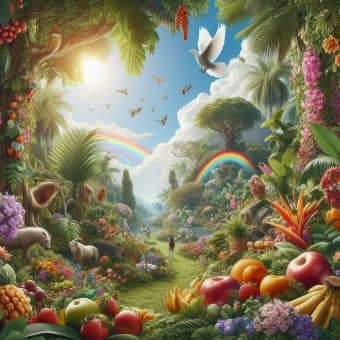Unearthing the Narratives of Adam and Eve
Insights into the Garden of Eden
The story of Adam and Eve, and the idyllic paradise known as the Garden of Eden, is one that has been told and retold through countless generations. It’s a narrative that has captivated scholars, theologians, and laypeople alike, offering profound insights into the human condition, morality, and the beginnings of mankind.

This blog post contains affiliate links. When you click on a link on this page and make a purchase I may earn a small commission, at no additional cost to you. Thank you for your support.
The Dawn of Creation in the Garden of Eden
In the beginning, according to the Judeo-Christian creation narrative found in the Book of Genesis, God created a pure, untainted world. The pinnacle of this creation was the Garden of Eden, a place of unspoiled beauty where the first humans, Adam and Eve, dwelled.
This garden was a symbol of peace and communion with God, replete with flourishing trees, shimmering rivers, and animals living in harmony.
God granted Adam and Eve almost complete freedom within this verdant habitat, with only one prohibition: they must not eat from the tree of the knowledge of good and evil. The bounty of the garden was theirs to enjoy — fruits that could sustain them, water that could refresh them, and the divine presence that walked among them in the cool of the day.
The Temptation and the Fall
Despite the abundance provided to them, the narrative tells us that Eve was tempted by the serpent, the most cunning of all the wild creatures God had made.
The serpent’s whispered lies sowed seeds of doubt in Eve’s heart, questioning the motive of God’s solitary prohibition. The fruition of this deceit was that both she and Adam ate the forbidden fruit.
The act of disobedience, described as “The Fall,” had profound consequences. It represented a departure from the innocence and purity of Eden, a severance of the unencumbered relationship with God.
The first bite brought knowledge, but it came with a heavy price — the understanding of good and evil, of shame and the loss of eternal life in the garden. They became aware of their nakedness and sewed fig leaves together as a primitive form of clothing.
Online dating Matching Based on Christian Principles
Banishment and Legacy
Due to their transgression, Adam and Eve were banished from the Garden of Eden, to prevent them from eating from the tree of life and living forever in their sinful state. They were sent out into the world, which would no longer yield to them so easily. The ground was cursed because of them, and in toil and sweat, they would need to labor for their survival.
The legacy of Adam and Eve and their life in the Garden of Eden is a cornerstone of many discussions on humanity’s innate nature, the origin of sin, and the need for redemption. It’s a story that has shaped doctrines and influenced the way faith communities view the world and humankind’s place within it.
A Complex Tapestry of Meaning
The Garden of Eden and its first inhabitants are not just characters in a story; they represent a complex tapestry of meaning and philosophy. Beyond the literal interpretations, the account challenges readers to reflect on themes of temptation, free will, and the consequences of one’s actions.
It also poses questions about the relationship between humans and the divine, and what it means to live in a perfect world versus one where suffering and struggle are a day-to-day reality.
The narrative of Adam and Eve in the Garden of Eden continues to offer a wealth of contemplation and discourse, providing deep reservoirs of theological, moral, and existential insights.
As one delves into the depths of the story of Adam and Eve, we find not just a tale of the first humans but an allegorical reflection of every person’s journey through life — a reminder of the paradise that was, the reality that is, and the hope for what could one day be restored.

